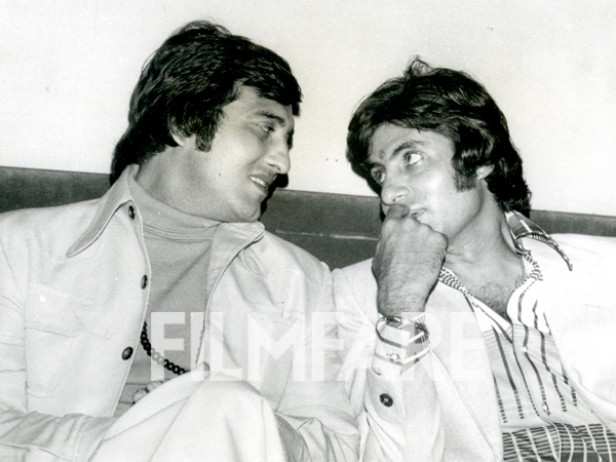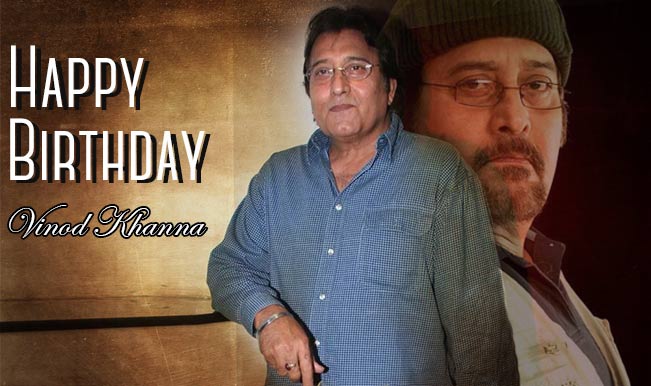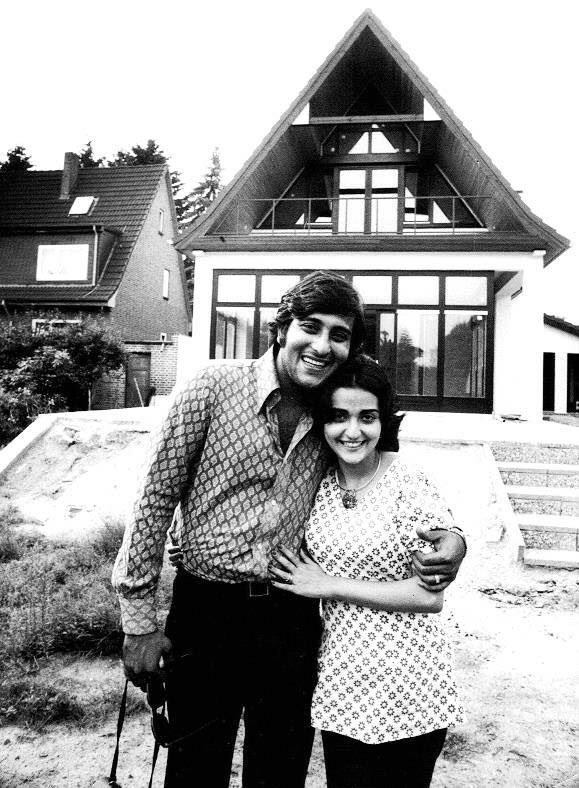Though he achieved stardom early in his life, Vinod Khanna retained the vulnerability of a seeker, one that was used to the fullest by the poet-director in Gulzar
Vinod Khanna had the ability to essay a contemplative gravitas that exuded depth of feeling. | AP
In Manmohan Desai's Randhir KapoorShatrughan Sinhastarrer Raampur Ka Lakshman (1972), cinephiles come across a delectable self-referencing moment. Kumar (Sinha) offers to take Rekha (Rekha) to Desai's earlier hit film Sachcha Jhootha (1970), starring the first superstar' Rajesh Khanna in the roles of both the protagonist and the antagonist. The film also has another Khanna' in a side role. The meta moment is not lost on a viewer watching Raampur in 2017 here were four actors trying to pick UP the baton of the Hindi film hero', sans the sachcha-jhootha (good-bad; true-false; real-fake) binary from their counterparts in the '60s.
Dev Anand, Dilip Kumar and Raj Kapoor were past the prime of their acting careers in the early '70s. The joie de vivre of the cinema of a Shammi Kapoor, a Biswajeet or a Joy Mukherjee could no longer be considered the staple. Raj Kapoor's eldest son tried to emulate his father by launching himself both as an actor and a director through Kal, Aaj aur Kal, succeeding only partly. Rajesh Khanna achieved superstardom after Aradhana in 1969 and stayed there for four years. Amid the Amitabh upheaval that was to come up later, and the rise of multi-starrer action films came the rise in careers of two villain-heroes, two actors Vinod Khanna and Shatrughan Sinha who transcended the sachcha-jhootha dichotomy by playing both roles in their careers, something Rajesh Khanna had done in the 1970 film.
Both the younger Khanna and Sinha starting off doing roles with traces of black in the '60s before graduating to those with shades of grey in the '70s. Khanna had played the outcast-bandit Jabbar Singh in Mera Gaon Mera Desh (1971) with a certain quietude, having few punch dialogues, unlike his spin-off in Sholay (1975), Gabbar Singh. The landmark film for Khanna and Sinha was Gulzar's directorial debut Mere Apne (1971), one where we see the different nuances of the disgruntled angry young man, one who is educated, ambitious but unable to find required opportunities.
Having an ensemble of talented newcomers from different parts of the country among them Danny, Dinesh Thakur and Paintal this remake of Tapan Sinha's Apanjan (1968) could be considered the consummate angry young man film, one where the innocence and idealism of the past finds its successor in the disillusionment of the present. This is best shown through the satirical 'haal-chaal theek-thaak hai' song.
Khanna, playing Shyam a handsome, literate man whose career gets ruined due to a brief spell in a lock-up shows the emotions of an anti-hero. He plays a craving individual who seeks comfort in a meandering life but is unable to find it and transforms into a local benefactor, a next-door godfather. This is best shown in the title song, where he recalls some moments of joy spent in the company of a beloved.
Ambling within a decrepit, decaying mansion, he seeks succour in the memory of the past, ultimately being forced to look inward. The cul-de-sac both emotional and professional that faced the talented unemployed individual of the early '70s is transparent. It's unfortunate that such realistic moments of vulnerability got overlooked in the audience's obsession with the Amitabh phenomenon later.
Khanna's best roles as an actor were to come for Gulzar, in films that would exploit his seeker' status to the fullest. In Achanak (1973)...
...he plays a convict who gets shot while on the run after killing his wife, who finds a new lease of life in hospital. Having lost his wife to adultery and anger, he finds happiness with a caring sister-figure nurse Radha (Farida Jalal) and the friendly Dr. Kailash (Asrani) in the nursing home, one that gives him a new lease of life.
In Meera (1979), he plays Raja Bhoj to whom the savant Meera is married against her wishes. Amid the judgemental eyes of the menfolk who cannot comprehend her single-minded devotion to an unknown force, Khanna's probing Bhoj transcends his surroundings, displaying rare fragility and more understanding than perhaps his patriarchal upbringing might have allowed him to summon. He even exhorts her to run away from home in a scene. In his final encounter with Meera, who is sentenced to death, he gets to witness the aura that her love for a divine entity has invested her with, and, feeling helpless, breaks down.
The searching eyes of Khanna were again on display in Lekin (1990), where he plays the poetic Sameer, who deals with antiquities as a museum curator. His visions make him feel the presence of Reva, someone whose entity transcends space and time. Is Reva a spirit? Is she a product of his own imagination? His contemplation of this is best reflected in the song 'Surmayi Shaam Is Tarah Aaye'.
Khanna's incisive acting gave the viewer a glimpse of the longing nature of Shyam from Mere Apne.
Equanimity does not usually make her way into the heads of actors who achieve stardom young in the film industry. The most glorious example of this is Rajesh Khanna, who got consumed by his short-lived superstardom.
Vinod Khanna, however, seemed to have handled the effects of stardom differently. Having tasted early success that made producers pay him more than even Bachchan, he perhaps felt a restlessness that set him on a quest for self-discovery beyond material comforts, which led him to embrace spirituality. It is unclear whether his stint with Osho Rajneesh brought him the succour his soul was looking for. If it did, his career choices and political choices later did not quite reflect that.
In any case, the quest for the unknown that must have suffused his real-life self in the '70s certainly found expression in the characters he played for Gulzar, such as Shyam,Ranjit, Raja Bhoj and Sameer. Credit should go to the auteur in Gulzar, for the poet in him could recognise the vulnerability of even someone with the faade of a villain, could sense the depth in the shallow persona of a superstar, could see the contemplation in the visage of a confused individual.
http://www.thehindu.com/thread/arts-culture-society/vinod-khanna-a-superstar-with-probing-eyes/article18272643.ece





comment:
p_commentcount